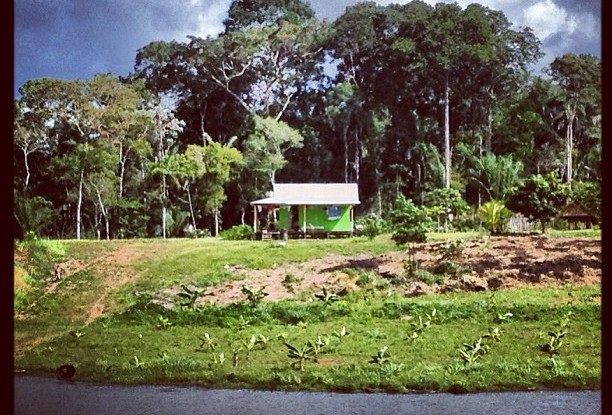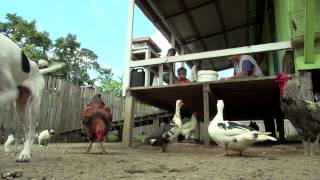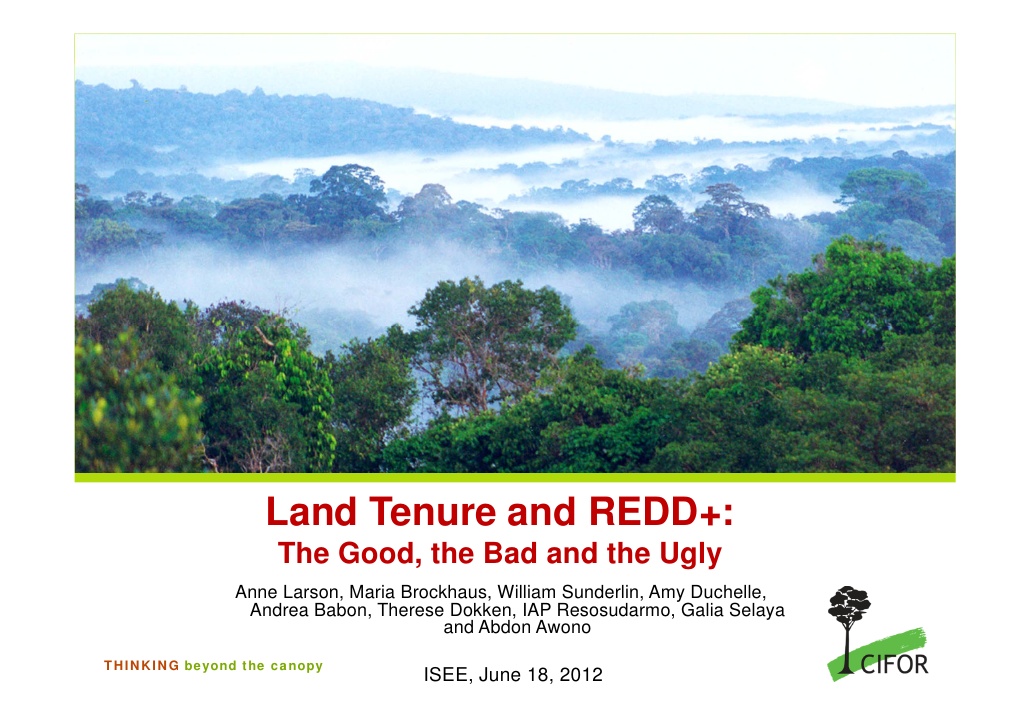
Incipient initiatives designed to reduce carbon emissions through avoided deforestation and forest degradation (REDD+) are also helping to secure forest land tenure in Brazil, a new study has found.
REDD+ is a UN-backed scheme that aims to mitigate global climate change through incentivising developing countries to keep their tropical forests standing – and is also seen by many as a way to promote conservation and bolster rural livelihoods in those forests.
Amy Duchelle and colleagues from the Centre for International Forestry Research (CIFOR) have examined four sub-national REDD+ initiatives in three very different states in the Brazilian Amazon, interviewing project proponents and community members about land tenure and local livelihoods.
There have been fears that people with legitimate rights to lands with unclear tenure could be excluded from early REDD+ initiatives, but the study found that at least in select sites these fears haven’t been borne out.
“Instead, the first step of setting up these initiatives was actually dealing with the land tenure issues,” Duchelle said.
“Proponents were really prioritising clarifying tenure and land rights in the areas where they were planning their interventions.”
Land tenure is crucial to the success of these kinds of schemes, as previous CIFOR research has found, because if you are going to reward someone for protecting the forest, or punish them for deforesting, you need to be sure who owns the land.
And it’s not just about ownership – locals also need to be able to stop outsiders coming onto their land and deforesting without their consent.
Although the legal documentation of land rights is complex and expensive, the REDD+ proponents that Duchelle and her team interviewed considered it to be essential for their programs’ effectiveness.
Local people, too, valued this emphasis – in one study site, in Acre, communities reported increased land tenure security thanks to the efforts of the proponents (in this case the state government) in property mapping.
The promise of land tenure regularization can thus be an important entry point for local people to engage with REDD+, Duchelle says.
“Our study highlights how sub-national REDD+ initiatives in Brazil operating in different contexts are prioritizing legal clarification of land tenure – in direct collaboration with government agencies and national initiatives – to allow for a similar mix of regulatory enforcement and incentive-based REDD+ mechanisms that are being adapted to local conditions,” she said.
“Clear land rights are not simply a prerequisite of these types of REDD+ smallholder schemes, but also one that gives participants a potential incentive”.
A violent history
In Brazil, as in much of Latin America, historically land tenure reform has not been good for forests. Over the past several decades, large landholdings in the Amazon have been redistributed to landless peasants demanding their own patch of soil.
These smallholders are often not the primary drivers of Amazonian deforestation – but they are a part of the picture, as clearing the forest is often used as a way to establish rights to land. In fact, Brazil’s constitution requires that private property perform a ‘social function’: so colonists deforest to prove that their land is productive.
We’re supporting producers to use new technologies that do not involve slash and burn, to help them produce and live sustainably here in the forest, without damaging the environment
This process has also been a source of conflict, as large property owners have employed militias or gunmen to defend their properties from invasion by landless smallholders – resulting in violence and murder, like that of rural leader Chico Mendes in Acre in 1989.
However, recent policy initiatives in the Amazon have attempted to reverse this trend, and link land tenure reform with environmental compliance. The incipient REDD+ schemes examined by Duchelle, she says, add incentives into this picture, encouraging local people to comply.
Incentives in Acre
One of the initiatives surveyed was the State System of Incentives for Environmental Services (SISA), implemented by Acre’s state government in an effort to promote low-carbon development by encouraging smallholders to adopt more sustainable agricultural practices and reduce deforestation.
Duchelle and colleagues surveyed four communities in the Priority Assistance Zone, a five-kilometre stripe along each side of a recently paved highway, placing it at risk of significant deforestation. At the time of the research, the area was also a “no-man’s land” in terms of formal property rights – meaning that in all four communities, tenure was perceived as very uncertain.
“As soon as this road was starting to be paved, you had a lot of people coming in with old claims on these lands, because they knew that the value would likely shoot up,” Duchelle said.
“And so it was really important for the government to work with the people who had been living in the area to demarcate their land holdings.”
At the same time, it implemented a program of incentives: technical assistance and direct cash payments for smallholders that adopted more sustainable agricultural practices.
“We’re trying to change an old tradition – cutting forests, planting, and abandoning the land or creating pastures,” says Edivilson Cardoso Gomes, from the state government’s Secretariat of Agroforestry Extension and Family Production (SEAPROF), which is charge of implementing this part of the program.
“We’re supporting producers to use new technologies that do not involve slash and burn, to help them produce and live sustainably here in the forest, without damaging the environment,” he says.
Challenges
But regularising land tenure is a big job, and in the Priority Assistance Zone in Acre it’s had to happen very quickly.
Duchelle’s article highlights the importance of paying careful attention to customary rights when undertaking this process.
“Rapid land tenure regularisation could be especially problematic for forest extractivists, who tend to live farther away from the road and manage large, irregular landholdings based on the location of rubber trees,” she says.
“If land rights are formalised as smaller, more uniform parcels, these people could lose access to their traditional resources, the rubber trees.”
Duchelle says it’s also important to note that there may be some trade-offs between conservation and the development outcomes associated with these reforms.
Promises of land rights, and REDD+ benefits, may draw new waves of migration to these areas – and land titles alone will not assure conservation by smallholders, making proponents’ plans for environmental compliance and sustainable land use incentives as important as securing rights, she says.
Cooperation
What is encouraging about the four REDD+ initiatives in this study, Duchelle says, is how closely NGOs and governments have worked together to implement the programs.
“The Brazilian situation holds a lot of promise, in that these early initiatives demonstrate very serious and successful partnerships between government and NGOs,” she says.
Eduardo Amaral Borges works for PESACRE (Group of Research and Extension in Agroforestry Systems of Acre), an NGO that was part of the process of negotiation when SISA was set up in Acre.
“There are things that the government does well and civil society cannot do, and there are others that civil society does well and the government does not,” he says.
For example, only government agencies have a mandate to regularize tenure and enforce the law – but they sometimes lack institutional capacity to implement these actions effectively.
“Civil society participation has become more complex,” Borges says. “The main issue in the past was putting up battle flags; now, these same social movements and NGOs are co-implementers of public policies and programs.”
“This requires support so civil society can participate and contribute qualitatively in this process.”
The commitment made by the four initiatives studied in the Brazilian Amazon to sort out the thorny issue of land tenure gives Duchelle hope that REDD+ can be implemented in Brazil in an effective and equitable way.
“Despite the continuing challenges, Brazil’s progress in linking forest tenure reform, environmental compliance and incentives could bode well for the success of REDD+,” she said.
For more information on issues discussed in this article, please contact Amy Duchelle at a.duchelle@cgiar.org
This research was carried out as part of the Global Comparative Study on REDD+ and the CGIAR Research Program on Forests, Trees and Agroforestry and was supported by AusAID, the Norwegian Agency for Development Cooperation (NORAD), the UK Department for International Development (DFID) and the Program on Forests (PROFOR).
We want you to share Forests News content, which is licensed under Creative Commons Attribution-NonCommercial-ShareAlike 4.0 International (CC BY-NC-SA 4.0). This means you are free to redistribute our material for non-commercial purposes. All we ask is that you give Forests News appropriate credit and link to the original Forests News content, indicate if changes were made, and distribute your contributions under the same Creative Commons license. You must notify Forests News if you repost, reprint or reuse our materials by contacting forestsnews@cifor-icraf.org.

